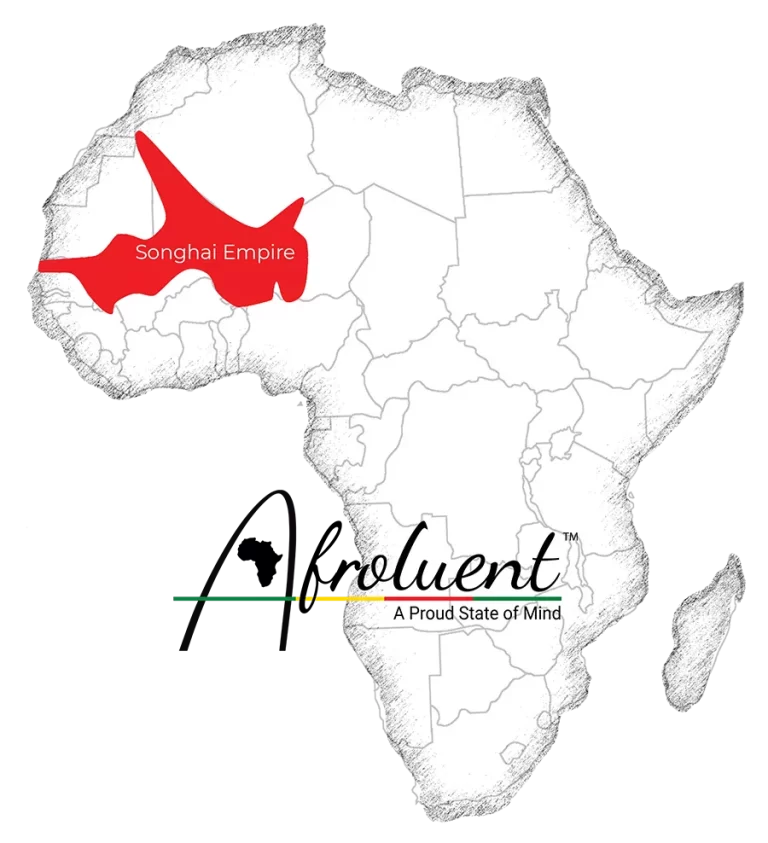Early African Civilizations History
Overview of the Songhai Empire
What was the Songhai Empire?
The purpose of this article is to provide a brief overview of the Songhai Empire. The Songhai Empire was one of the largest African empires. The West African Empire ruled from c. 1464 CE to 1591 CE. The Mali empire is the predecessor.
The Songhai Empire covered the areas of the modern countries of; The Gambia, Mali, Ivory Coast, Senegal, Mauritania, Nigeria, Guinea, South of Algeria, and Burkina-Faso.
The Beginning of the Empire.
This section will give a brief overview of the beginning of the Songhai Empire. The beginning the Empire evolved from the Songhai people that settled on the banks of the Niger River in what is modern-day Mali. Eventually, a Songhai state emerged in and around Gao (c. 1000 CE).
Subsequently, it became independent from the Mali Empire around c. 1430 CE. After that, the Songhai people lead by Sunni Ali, attacked and conquered much of the Mali Empire. As a result, this gave birth to the Songhai Empire, whose name came from its ethnic group, the Songhai.
Furthermore, the Empire achieved success because of a highly skilled army and diplomatic agreements. In addition, they also created administrative districts for efficiency and to maintain maximum control over the region.

What was the Capital?
The Capital city of the Empire was Gao. This city of Gao is located in what is today Mali. Gao city was the center of a previous Empire call the Gao Empire.
What was the Songhai Empire Religion?
The main religions were Sunni Islam and other traditional African religions. Eventually, Islam became the dominant religion within the royals and elites. The people kept their traditional religions despite the spread of Islam. Islam and traditional African religions were able to coexistence throughout the empire.
Importantly, founder Sunni Ali wasn’t a devout Muslim. He pushed mainly for the practice of traditional African religions. Ultimately, after his death, the Muslim elites were able to establish Islam as the dominant religion.
What was the Songhai Empire Capital?
The Capital city of the Empire was Gao. At the present time, the city of Gao is located in what is today the country Mali. Gao city was the center of a previous Empire call the Gao Empire.
What was the Songhai Empire Religion?
The main religions were Sunni Islam and other traditional African religions. Eventually, Islam became the dominant religion within the royals and elites. However, the some people kept their traditional religions despite the spread of Islam. Islam and traditional African religions were able to coexistence throughout the empire.
Importantly, founder Sunni Ali wasn’t a devout Muslim. He pushed mainly for the practice of traditional African religions. Ultimately, after his death, the Muslim elites were able to establish Islam as the dominant religion.
What was the main language spoken Songhai Empire?
The main languages spoken during the time of the empire are; Songhai, Malinké, Mandinka, Fulani, Bozo, Soninke, Hausa, and Mooré.
What did the Songhai Empire trade?
Trade in the empire consisted mainly of gold, copper, salt, ivory, spices, palm oil, and slaves. At that present time, they controlled the major trading city of Timbuktu on the Niger River.
What caused the fall of the Songhai Empire?
The empire’s decline was due to Incompetent leaders, dynastic disagreements, civil wars, and rebellions. However, it was the Moroccan Saadian Empire invasion that caused the final downfall.
Conclusion
To conclude, the key to the success of the Songhai Empire were; conquest, warfare, and strategic agreements. In addition, the rulers created a new system of laws and promoted the learning of new ideas. As a result, Songhai became known across the world as a hub for scholarship and education. Finally, the empire’s success was a combination of lessons learned from its predecessors, the Ghana and Mali Empires.
